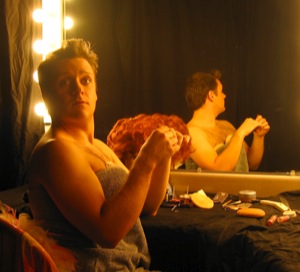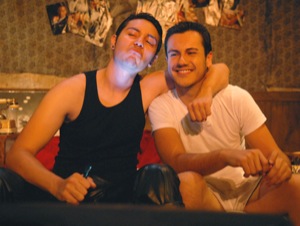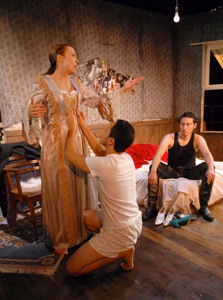-
- National Right to Life Committee endorses Thompson
- ‘Gayborhoods’ gaining buzz in Salt Lake City
- Chicago Lutheran Church ordains lesbian
- Feds enter HIV transplant probe
- Spread of AIDS virus to transplant patients signals need for more information on donors
- San Francisco to issue city ID cards to illegal immigrant and transgender residents
- National News Briefs
- World News Briefs
Arts & Entertainment
A gay trifecta: students, hustlers and drag queens
Published Thursday, 22-Nov-2007 in issue 1039
The History Boys
The History Boys are a group of bright, articulate and often unruly sixth formers with attitude and potential in a Yorkshire boys’ school in 1983. They have just delighted their headmaster (H. Richard Greene) by turning in the best A-level exam scores in the school’s history, placing them in a good position to be admitted to Oxford or Cambridge.
Because their good showing will reflect on his school, the headmaster hires Irwin (Peter Paige) as a temporary tutor to give the boys “polish” – and a leg up in the upcoming university entrance exams.
The History Boys premiered at London’s National Theatre in 2004 and subsequently took Broadway by storm, winning six Tony awards and “best play” honors from eight critics’ groups. It’s a talky show, characterized by a much higher level of chatter than you will hear from most American teens. These boys have spent their school careers learning history and have memorized reams of poetry, and their conversation shows it.
It’s not that they aren’t concerned about teen stuff. Posner (Alex Brightman) is gay and crazy about hunky Dakin (Seth Numrich), who has all the girls after him. Then there’s the rugby-playing Rudge (Cord Jackman), to whom getting into Oxford seems less exciting than winning a game. And Scripps (Brett Ryback), the religious one, who plays a mean piano and is trying to “get through this romance with God now or else it’ll be hanging around half my life.”
But The History Boys is as much about teachers as students. Here, it’s a troika. First, the unconventional Hector (Dakin Matthews), a rotund teacher of “general education” (though he’s the first to admit there is no such thing: “all learning is specific”), who makes his boys memorize gobs of poetry and be prepared to analyze it at the drop of a hat. Hector has a penchant for giving a ride home to one boy each day on his motorcycle; the students regard the groping that accompanies this act as a bit of a rite of passage, but the headmaster takes a dimmer view.
Then there’s Irwin, the young Turk hired to teach the boys to think outside the box (asking them to consider one good thing about Stalin, for example) so that their entrance exams might stand out from the pack.
Finally, Mrs. Lintott (Charlotte Cornwell), feminist and lone woman in a distressing sea of testosterone, complains, “Can you imagine how depressing it is to teach five centuries of masculine ineptitude? History is a commentary on the continuing incapabilities of men ... women following behind with a bucket.”
This road show uses sets from both the British and Broadway productions and cleverly covers frequent set changes with frenetic but captivating black-and-white video projections of school scenes.
In this all-around excellent American cast, Brightman is heartbreaking as Posner, Numrich properly arrogant as Dakin, Old Globe favorite Matthews convinces as Hector and Cornwell is wonderfully acerbic as the lone woman.
Educational assessment (and “teaching to the test”), history, literature and ethics have never been as engagingly presented as in The History Boys.
The History Boys runs through Dec. 9 at the Ahmanson Theatre in Los Angeles. Shows Tuesday through Saturday at 8 p.m.; Sunday at 6:30 p.m.; matinees Saturday at 2 pm. and Sunday at 1 p.m. For tickets call 213-628-2772 or visit www.CenterTheatreGroup.org.
Torch Song Trilogy
Harvey Fierstein changed theater history in 1982 with his groundbreaking Torch Song Trilogy, a set of one-act plays about a gay drag queen and his search for love and human connection. Torch Song Trilogy was one of the first plays to star gay characters, and Fierstein was the first to win Tonys for both best play and best actor.
Written in the innocent pre-AIDS ’70s when more gays died of violence than disease, Torch Song Trilogy brought mainstream audiences into the lives of four gay men and their various family and domestic connections.
Diversionary Theatre presents a 20th anniversary production of the play through December 16, directed by Tim Irving. The trilogy makes for a long but consistently engaging evening of theater.
International Stud, the first and funniest of the set, begins with drag queen Arnold Beckoff a.k.a. Virginia Hamm (Matthew Weeden) dressing for work and musing about his search for love. His relationships have always been short (“Face it, a thing of beauty is a joy ‘til sunrise’”), but he continues to dream and hope for a long-term commitment.
One night, in gay backroom bar International Stud, he meets, falls in love with and is ultimately disappointed by Ed (Barron Henzel), a conflicted bisexual who finally deserts Arnold for a woman.
Arnold goes back to the bar with unseen friend Murray, who drags him to the back room, where in a hilarious scene Arnold has anonymous sex (the partner invisible to both Arnold and the audience) and continues his monologue, even while smoking. “I never enjoy sex with someone I know,” he quips.
Act two takes place a year later, when Ed’s girlfriend Laurel (Amanda Sitton) invites him to spend the weekend at their country house upstate. Arnold agrees only because his current love, hunky 17-year-old model Alan (Sidney Franklin), wants to go, and Laurel gives her okay.
Fugue in a Nursery takes place on an enormous bed where the joys and sorrows of domesticity are exposed as both couples in various combinations converse and sometimes overlap, one answering the other’s question.
“This is so civilized!” Laurel gushes, while Alan grumbles, “I’d like to spend two minutes without someone trying to shove me onto a couch.”
Back in New York, both couples make plans for permanent commitment.
By the third act, Widows and Children First!, Arnold has lost Alan to a mob of gay bashers and become foster parent to gay 15-year-old David (Tom Zohar), removed from an abusive home. The about-to-be-divorced Ed reappears, crashing on Arnold’s couch while he looks for an apartment. When Arnold’s widowed mother (Jill Drexler) shows up, old wounds are reopened and hurtful words said on both sides, especially when Mrs. Beckoff discovers Arnold is likely to apply for formal adoption of David.
The play ends hopefully, as Mrs. Beckoff finally accepts Arnold’s plan, Ed tentatively moves in and David can at last count on a father.
Fierstein’s way with a funny line must have made his points: Gays and straights are more similar than different in the basics; honesty is important, as are respect and family values. (If that sounds silly, cast your mind back to 1982, when gays were considered much more a separate species than they are today.)
Irving has blocked this show magnificently, and is blessed with a terrific cast. Weeden is channeling Fierstein, especially in the first scene, and that is a high compliment. He also has great comic timing, as does Zohar, clearly enjoying himself immensely as the wisecracking David. Henzel handles the difficult role of Ed with seeming ease. I’m tempted to say Franklin is so gorgeous it doesn’t matter what he does, but in fact he is also a fine actor. And Sitton and Drexler are excellent in the least sympathetic parts.
Torch Song Trilogy is bright, funny and important, both for its message and its place in theater history. This play is as long as a Wagner opera (about four hours), but a whole lot more engaging.
Torch Song Trilogy plays through Dec. 16 at Diversionary Theatre. Shows Thursday at 7 p.m.; Friday and Saturday at 7:30 p.m.; Sunday at 2 p.m. and a Monday, Nov. 26 performance at 7 p.m. For tickets call 619-220-0097 or visit www.diversionary.org.
Punks
Genet meets Raygoza in Punks, by ion theatre’s artistic director Claudio Raygoza, in its world premiere through Dec. 16 at ion’s space at the Academy of Performing Arts, directed by Glenn Paris, ion’s producing director.
Punks was inspired by absurdist playwright Jean Genet’s The Maids, which itself was inspired by the 1933 real-life murder of a wealthy French woman and her daughter by their two maids. Genet wanted the maids to be played by young boys, but it has traditionally been cast with women. Raygoza has transformed the maids into Latino dope-addicted hustlers and added meditations on theater, art and writing to Genet’s themes of illusion/reality, freedom/slavery and identity/role-playing.
Aspiring actor Jesus (Markuz Montano) is kept by the gray flannel-suited Marion Papin (Robin Christ), a pianist in gay clubs who may be connected in an unstated way to theater or film. Marion has also hired aspiring writer Cristóbal (Steven Lone), apparently expecting performance rather than writing.
In the opening scene, Cris and Jesus are asleep in a red-spreaded bed shielded from public view by a sheer red curtain. The alarm signals showtime; they arise, dress and spout the turgid purple prose of a telenovela-level rehearsal piece for their voyeur employer. (Samples: “I’ll suffocate in the mists of your desires;” “It’s the perfume of my agony you smell”).
When the “play” ends, the real play begins, as artistic prostitutes Cris and Jesus berate each other, exchange power positions and succumb to the pleasures of chemical stimulation.
Marion brings sardonic comic relief while expressing the theater-as-art vs. theater-as-entertainment duality. First he spouts Raygoza’s theory of theater as life-changing event rather than bargain-basement Mcentertainment. To those who want the latter, Marion counsels, “I say go home and jerk off. It works and it won’t take two fuckin’ hours.”
But later, Marion describes a cheesy plot idea about missionaries in Morocco, ending with this delicious slam on writers: “The details can be left to the writer. I can’t be bothered. I’m the artist.”
Christ, always a standout, anchors this fine trio with a performance at once intelligent, funny and thought-provoking. Rodriguez (looking great in leather) and Lone (looking great nude) are convincing and sad as the artist/whores.
Punks is complex, multilayered, think-about-it-later theater, full of profanity, perversion and psychological twists. It is not for all audiences.
See it if you’re up to it.
Punks plays through Dec. 16 at The Lab at the Academy of Performing Arts. Shows Thursday through Saturday at 8 p.m.; Sunday at 7 p.m. For tickets call 619-374-6894 or visit www.iontheatre.com.
|
|
Copyright © 2003-2025 Uptown Publications




